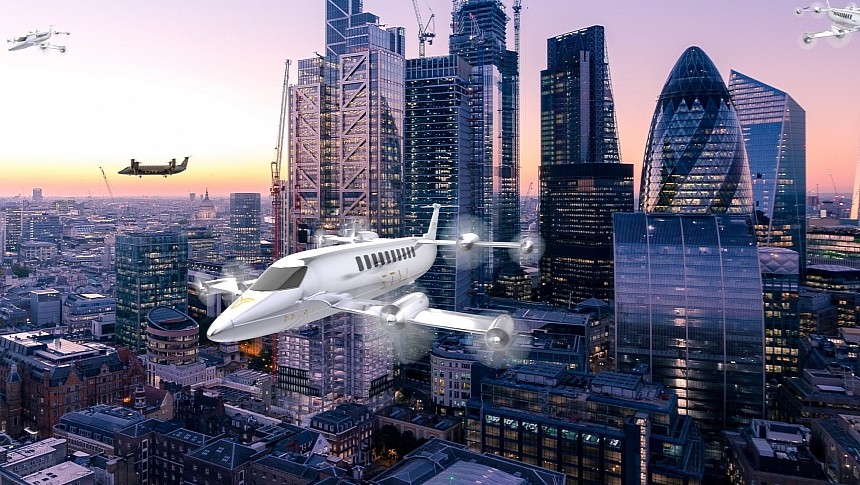If most eVTOL (electric vertical takeoff and landing) concepts today were designed as flying alternatives to cars, someone had to come up with similar alternatives to buses and even trains. The startup that was bold enough to do that is Lyte Aviation, and its disruptive SkyBus concept is already enjoying increasing demand on the global market.
The aptly named SkyBus is as cool as it sounds – a low-emission, fast, and rugged version of a bus that can fly. This impressive concept combines the benefits of a tilt-wing VTOL design with a large capacity and a hybrid propulsion system based on hydrogen and sustainable aviation fuel (SAF).
The UK-based Lyte Aviation unveiled its flagship aircraft concept earlier this year, and it was received with great enthusiasm on the global market. The company's founder and CEO, Freshta Farzam (a German entrepreneur), says that they're currently discussing several potential partnerships.
One of the most remarkable ones is with Vman, an aviation operator based in India. Vman has committed to a pre-order of ten SkyBus units for its fleet, which will pave the way for green regional mobility in India. The Indian operator is willing to wait, considering that the first deliveries will start five years from now.
India is perhaps one of the best markets for this disruptive air mobility concept. According to Vman, the typical two-seat or four-seat electric air taxis are not as well suited for the vast population and specific mobility demands across India. SkyBus, instead, boasts both a huge capacity and the ability to reach remote areas with challenging infrastructure.
The SkyBus concept claims to be six times faster than a conventional ground-based bus and five times more fuel-efficient than a standard helicopter. It's designed to fly with 40 passengers, two pilots, and two crew members onboard at a top speed of 300 kph (186 mph). It combines a tandem tilt-wing design with two separate propulsion systems. One is electric, harnessing the power of hydrogen fuel cells, and the other one is a conventional turbine that is compatible with both regular jet fuel and SAF.
Lyte Aviation also developed a cargo version of the SkyBus, named SkyTruck, which boasts the same 1,000 km (620 miles) range, large capacity, and the ability to land in remote areas. Both versions are runway-independent and only need a 40 x 40 meter (131 feet) landing pad.
The bold startup is off to a good start, considering that it needs two more years for a full-scale prototype of the SkyBus. Lye expects to kick off serial production within five to six years when it will also start delivering the first units to Vman. This pioneering collaboration could help turn India into a hub for disruptive air mobility.
The UK-based Lyte Aviation unveiled its flagship aircraft concept earlier this year, and it was received with great enthusiasm on the global market. The company's founder and CEO, Freshta Farzam (a German entrepreneur), says that they're currently discussing several potential partnerships.
One of the most remarkable ones is with Vman, an aviation operator based in India. Vman has committed to a pre-order of ten SkyBus units for its fleet, which will pave the way for green regional mobility in India. The Indian operator is willing to wait, considering that the first deliveries will start five years from now.
India is perhaps one of the best markets for this disruptive air mobility concept. According to Vman, the typical two-seat or four-seat electric air taxis are not as well suited for the vast population and specific mobility demands across India. SkyBus, instead, boasts both a huge capacity and the ability to reach remote areas with challenging infrastructure.
The SkyBus concept claims to be six times faster than a conventional ground-based bus and five times more fuel-efficient than a standard helicopter. It's designed to fly with 40 passengers, two pilots, and two crew members onboard at a top speed of 300 kph (186 mph). It combines a tandem tilt-wing design with two separate propulsion systems. One is electric, harnessing the power of hydrogen fuel cells, and the other one is a conventional turbine that is compatible with both regular jet fuel and SAF.
Lyte Aviation also developed a cargo version of the SkyBus, named SkyTruck, which boasts the same 1,000 km (620 miles) range, large capacity, and the ability to land in remote areas. Both versions are runway-independent and only need a 40 x 40 meter (131 feet) landing pad.
The bold startup is off to a good start, considering that it needs two more years for a full-scale prototype of the SkyBus. Lye expects to kick off serial production within five to six years when it will also start delivering the first units to Vman. This pioneering collaboration could help turn India into a hub for disruptive air mobility.







